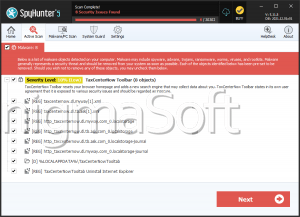CenterNow
CenterNow has been identified as a rogue adware application. Adware applications are notorious for possessing various intrusive capabilities. In most cases, their main goal is to generate revenue for their developers by running unwanted advertisement campaigns. When it comes to CenterNow in particular, the researchers have confirmed that it belongs to the AdLoad adware family. Furthermore, it is targeted at Mac users specifically.
Adware Like CenterNow Should be Removed as Soon as Possible
Adware operates by delivering intrusive advertising campaigns that aim to promote various content. In essence, this type of software facilitates the placement of advertisements on visited websites and different interfaces, thereby enabling advertisers to reach a broader audience.
These advertisements often endorse online scams, untrustworthy or hazardous software, and even malware. Some of these intrusive ads can go beyond mere promotion and initiate stealthy downloads or installations when clicked by unsuspecting users.
It is crucial to note that any legitimate content encountered through these advertisements is likely promoted by scammers who exploit the affiliate programs associated with the content to gain illegitimate commissions. This highlights the deceptive nature of adware and the potential risks it poses.
Furthermore, this rogue application exhibits data-tracking abilities, allowing it to collect sensitive user information. The targeted data may include visited URLs, viewed pages, searched queries, internet cookies, login credentials (such as usernames and passwords), personally identifiable information, credit card numbers, and more. This collected data can be shared with or sold to third parties, further compromising user privacy and security.
Adware and PUPs (Potentially Unwanted Programs) Often Rely on Questionable Tactics for Their Distribution
PUPs and adware employ various tactics to install themselves on users' devices without attracting attention. These methods often exploit users' lack of awareness or take advantage of deceptive techniques. One common approach is bundling, where PUPs and adware are bundled with legitimate software downloads. Users may unknowingly agree to install additional programs during the installation process without thoroughly reviewing the installation prompts or understanding the consequences.
Another method is through misleading advertisements and deceptive download links. PUPs and adware may be disguised as legitimate software updates, security scans, or enticing offers. Users who click on these advertisements or download links are often tricked into downloading and installing unwanted programs onto their devices.
Social engineering techniques also play a role in the installation of PUPs and adware. They may use manipulative tactics, such as fake system alerts or scareware messages, to convince users that their devices are infected or at risk, prompting them to download and install the provided software, which is often the unwanted program itself.
Additionally, PUPs and adware may employ stealthy installation techniques that attempt to evade detection by security software. They may modify system settings, inject code into legitimate processes, or hide their presence within the system to avoid being detected and removed.
Overall, PUPs and adware rely on tactics that exploit users' trust, lack of caution, and vulnerability to deceptive techniques in order to infiltrate their devices unnoticed.


